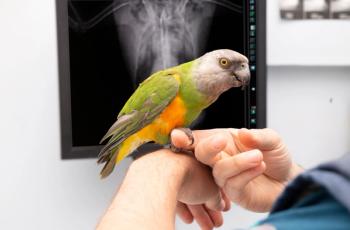
Pomeranian survives multi-drug exposure at music festival
Rocky, a pomeranian, was treated for cocaine, THC, and amphetamine poisoning.
Last month, toxicology experts with Pet Poison Helpline helped save a Pomeranian who tested positive for cocaine, amphetamines, and tetrahydrocannabinol (THC)—the psychoactive compound in marijuana. The dog, named Rocky, was exposed to the drugs at a music festival.
“...we received a call from a mother who picked her daughter up from a music festival and decided to bring the daughter’s Pomeranian named Rocky along for the ride,” Renee Schmid, DVM, DABT, DABVT, a senior veterinary toxicologist and director of veterinary medicine at Pet Poison Helpline, said in a Pet Poison Helpline release.1 “The festival had a very clear no-pets policy, which is why the daughter had not taken Rocky with her to the outdoor event.”
According to Pet Poison Helpline, Rocky accompanied the mother when she picked up her daughter. While the daughter finished packing, Rocky began exploring nearby campsites.
After a few minutes of roaming, the Pomeranian began vomiting, said Schmid. The daughter reportedly took him home for a nap, but later noticed he wasn’t sleeping normally, so she brought him to a veterinary hospital, where Pet Poison Helpline was contacted for help.
In cats and dogs, THC poisoning can cause a dazed expression, glassy eyes, incoordination, slow response times, dribbling urine, vomiting, drooling, changes in heart rate, vocalization, neurological stimulation, hyperactivity, or coma.2 According to Pet Poison Helpline, clinical signs may appear within minutes to hours, depending on the route of exposure.2
When it comes to cocaine, a small amount of the drug is enough to cause poisoning. Animals in the early stages of cocaine poisoning may exhibit hyperactivity, dilated pupils, twitches or tremors, and seizures, with death also possible.3
Amphetamine poisoning, meanwhile, can cause severe clinical signs affecting the central nervous, cardiovascular, gastrointestinal, and respiratory systems. Symptoms include4:
- Agitation
- Dilated pupils
- Tremors
- Seizures
- Elevated heart rate
- High blood pressure
- Drooling
- Vomiting
- Diarrhea
- Panting
- Aggression
- Sedation
“The hospital’s medical team, working in conjunction with Pet Poison Helpline toxicology experts, developed an aggressive treatment plan that saved Rocky’s life,” Schmid said.1 “In fact, we’re using this case to launch our new Lifesavers promotional campaign, because everyone involved in the process had a hand in saving him.”
Pet Poison Helpline’s Lifesaver campaign is a new initiative designed to highlight real cases in which the organization helped save pets from potentially life-threatening exposures. It will feature tradeshow materials, social media content showcasing these stories, and will build on the organization’s existing educational Toxin Tails campaign.
“The pet owner was observant and took Rocky to the hospital, saving his life. The hospital team knew the symptoms involved potential toxins, so they called Pet Poison Helpline for assistance, saving Rocky’s life,” Schmid continued. “Every person who helped Rocky along the way is his lifesaver.”
According to the animal poison control center, when Rocky arrived at the veterinary hospital, he was unaware of his surroundings and experiencing hypothermia, bradycardia, and hypotension. Hospital staff quickly initiated treatment, providing intravenous fluids to support his low blood pressure and provide cardiovascular support. Rocky also received reversal agents typically used for opioid and benzodiazepine overdose in case he had also been exposed to those drugs. Additionally, the staff took measures to raise his body temperature.
To stabilize Rocky’s low heart rate and help improve toxin removal from his system, the team administered additional medications and therapy.
“Urine drug screen results can be inaccurate in animals due to differences between animals and humans, making it important to treat the pet’s symptoms, not necessarily the test results,” Pet Poison Helpline said in the release.1
References
- Dogs, drugs and rock ‘n’ roll. News release. Pet Poison Helpline. October 1, 2025.
- Marijuana. Pet Poison Helpline. Accessed October 1, 2025.
https://www.petpoisonhelpline.com/poison/marijuana/ - Cocaine. Pet Poison Helpline. Accessed October 1, 2025.
https://www.petpoisonhelpline.com/poison/cocaine/ - Amphetamines. Pet Poison Helpline. Accessed October 1, 2025. https://www.petpoisonhelpline.com/poison/amphetamines/
Newsletter
From exam room tips to practice management insights, get trusted veterinary news delivered straight to your inbox—subscribe to dvm360.




